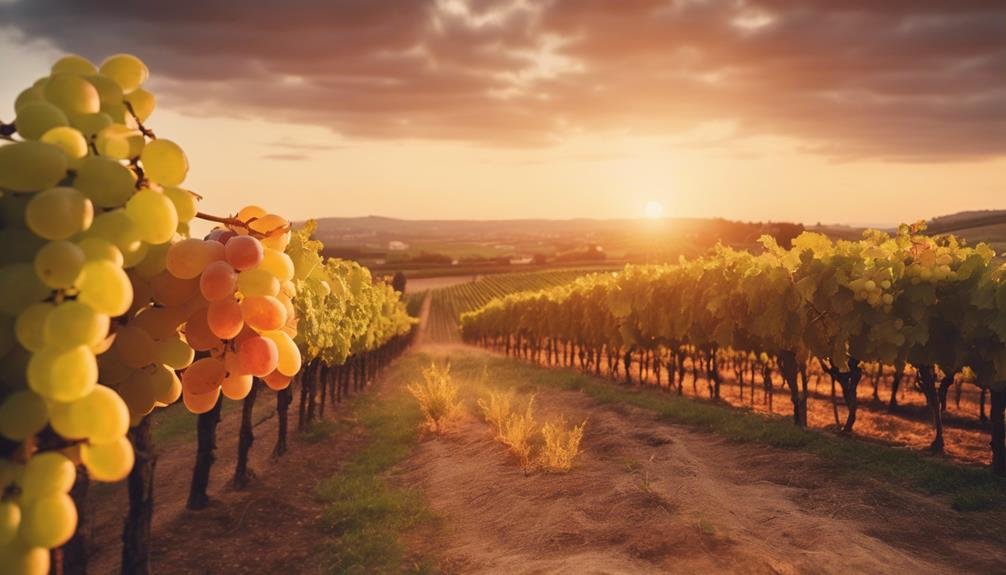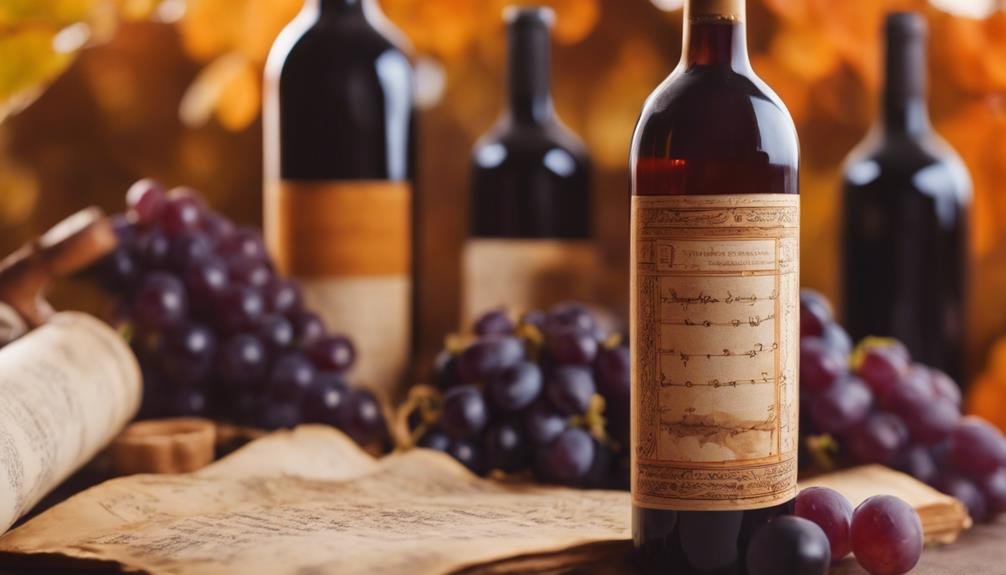Discover the ancient secrets of orange wine, a fascinating and dry beverage with honeyed aromas of jackfruit and dried orange rind. This unique wine contains tannins and sourness akin to fruit beer, offering a versatile option for food pairing. Produced without additives or yeast in earthenware amphorae, orange wine gains nutty flavors through oxygen exposure during fermentation. Grape varieties like Ribolla Gialla and Rkatsiteli contribute to its distinctive dry fruit and resinous notes. Ideal with spicy cuisine and fermented flavors, orange wine serves as an intriguing exploration of new tastes and traditions. Gain insight into this centuries-old winemaking process.
Orange Wine Characteristics
Bold and dry with honeyed aromas reminiscent of jackfruit, hazelnut, and dried orange rind, orange wines exhibit a unique profile that sets them apart from traditional white and red wines.
These wines also contain tannins and a sourness similar to fruit beer, which contribute to their distinctive taste.
The tannins, derived from prolonged skin contact during fermentation, add structure and texture to orange wines, while the sourness enhances their overall complexity.
Due to their natural acidity and tannin, orange wines pair exceptionally well with a variety of foods, making them a versatile choice for different culinary experiences.
The intriguing combination of honeyed aromas, tannins, and sourness makes orange wines a captivating option for wine enthusiasts looking to explore new and distinct flavors.
Historical Significance and Production Techniques
Dating back 5,000 years to Georgia, the historical significance of orange winemaking reveals ancient techniques and traditions that continue to intrigue modern wine enthusiasts. Orange wine production involves unique methods that set it apart from other winemaking practices.
- Ancient methods: Orange wines are made without additives or yeast, utilizing large buried earthenware amphorae for fermentation.
- Fermentation process: Exposure to oxygen during fermentation transforms fresh fruit aromas into nutty flavors in orange wine.
- Skin contact: Astringent tannins in orange wine come from extended skin contact during the fermentation process.
- Traditional vessels: Qvevri, large ceramic vessels buried in the ground, play an important role in the production of orange wine, preserving ancient winemaking traditions.
Unique Flavors and Grape Varieties

Exploring a diverse range of flavors and grape varieties, orange wines offer a compelling glimpse into ancient winemaking traditions. Ribolla Gialla from Northeastern Italy and Slovenia presents dry, stewed fruit nuances, while Rkatsiteli hailing from Georgia delivers citrus and resinous notes with a red-amber hue. Pinot Grigio, known as ramato, showcases a honeyed palate and rich red-orange color. These grape varieties contribute to the unique characteristics of orange wines, providing a spectrum of tastes and colors that captivate the senses. Below is a table highlighting the distinctive features of these grape varieties:
| Grape Variety | Flavor Profile |
|---|---|
| Ribolla Gialla | Dry, stewed fruit nuances |
| Rkatsiteli | Citrus, resinous flavors, red-amber color |
| Pinot Grigio (ramato) | Honeyed palate, rich red-orange color |
Food Pairing With Orange Wine
Orange wines, with their diverse array of flavors and grape varieties, offer a versatile companion to a wide range of bold and spicy dishes, making food pairing an intriguing aspect of experiencing these unique wines. When considering food pairing with orange wine, here are some key points to keep in mind:
- Orange wines pair exceptionally well with spicy cuisine, enhancing the flavors of dishes like curry and Mexican mole.
- They also complement fermented flavors such as kimchi and sauerkraut, creating a harmonious balance on the palate.
- Orange wines can be enjoyed with a variety of proteins, including beef and fish, due to their complex and robust nature.
- The tannins in orange wine help cut through rich and bold flavors, making them a great match for Mediterranean dishes and hard cheeses.
Additional Information and Resources

Extensively researched and documented, the domain of orange wine encompasses a rich tapestry of historical significance, unique production techniques, and diverse flavor profiles. Orange wine is made from white wine grapes with extended skin contact, originating in Georgia and not from oranges.
Ranging in color from pale orange to deep amber, these wines exhibit varying acidity levels and a grippy texture reminiscent of red wines. Production methods involve utilizing large buried earthenware amphorae without additives or yeast, allowing exposure to oxygen during fermentation for the development of nutty flavors.
Tasting notes often include bold and dry profiles with honeyed aromas like jackfruit, hazelnut, and dried orange rind, complemented by tannins and a sourness akin to fruit beer. For further exploration, Madeline Puckette's Wine Folly provides valuable resources for those interested in delving deeper into the world of orange wine.
Frequently Asked Questions
Can Orange Wine Be Aged Like Traditional Red and White Wines?
Orange wine can be aged like traditional red and white wines, offering aging potential. With unique flavor profiles, the tannins and acidity in orange wine develop complexity over time, enhancing the overall drinking experience.
What Climate Is Ideal for Producing Orange Wine Grapes?
Ideal climates for producing orange wine grapes typically feature well-draining soils rich in limestone or clay. Vineyards at higher altitudes often yield grapes with enhanced acidity. Harvesting techniques involve picking slightly riper grapes, followed by extended skin contact during fermentation for unique flavor extraction.
Are There Specific Regions Known for Producing Exceptional Orange Wines?
Specific regions known for exceptional orange wines showcase a blend of terroir influence and unique winemaking techniques. Areas like Northeastern Italy, Slovenia, Georgia, and Friuli in Italy are renowned for producing distinctive and high-quality orange wines.
How Does the Production of Orange Wine Impact the Environment?
The production of orange wine, utilizing techniques like Qvevri and organic farming practices, can promote environmental sustainability. By minimizing additives and embracing natural processes, orange winemakers reduce chemical inputs and waste, fostering a more eco-friendly approach to winemaking.
Can Orange Wine Be Used in Cocktail Recipes Like Traditional Wines?
Orange wine cocktails present a unique twist to traditional recipes. Their bold flavors and tannins offer a sophisticated depth, perfect for crafting innovative drinks. With options like Ribolla Gialla or Rkatsiteli, the cocktail scene gains a rich, aromatic addition.
Conclusion
In the world of orange wine, ancient traditions and innovative techniques converge to create a truly unique and flavorful experience. Just like a fine wine, the secrets of orange wine are meant to be savored and appreciated over time, revealing layers of complexity and history with each sip.
So next time you uncork a bottle of orange wine, remember that you are not just tasting a beverage, but delving into a rich tapestry of ancient knowledge and craftsmanship. Cheers to the mysteries of orange wine!